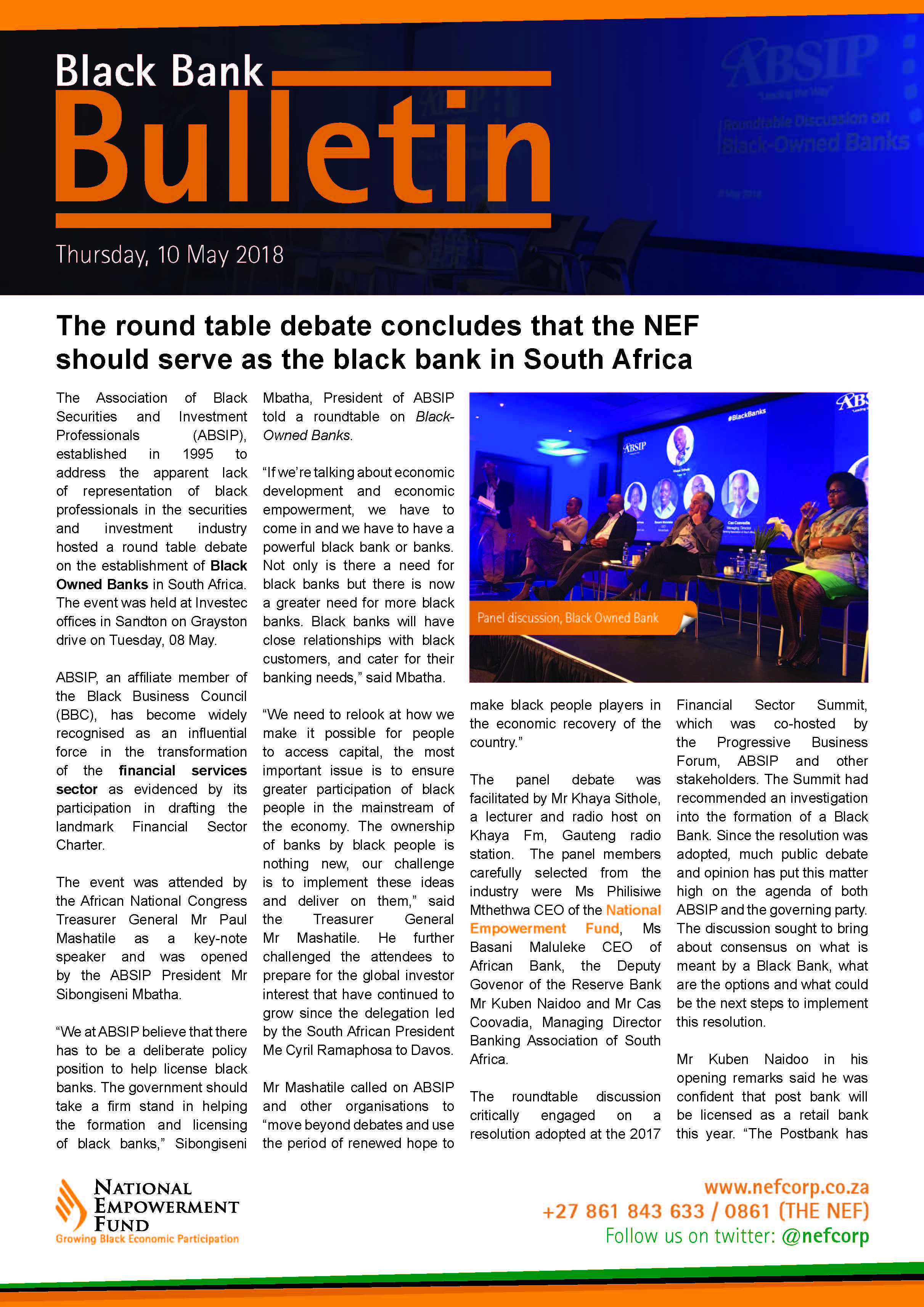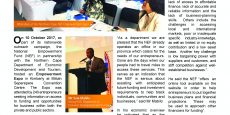
The Round Table Debate Concludes That The NEF Should Serve as The Black Bank in South Africa
The Association of Black Securities and Investment Professionals (ABSIP), established in 1995 to address the apparent lack of representation of black professionals in the securities and investment industry hosted a round table debate on the establishment of Black Owned Banks in South Africa. The event was held at Investec offices in Sandton on Grayston drive on Tuesday, 08 May.
ABSIP, an affiliate member of the Black Business Council (BBC), has become widely recognised as an influential force in the transformation of the financial services sector as evidenced by its participation in drafting the landmark Financial Sector Charter.
The event was attended by the African National Congress Treasurer General Mr Paul Mashatile as a key-note speaker and was opened by the ABSIP President Mr Sibongiseni Mbatha.
“We at ABSIP believe that there has to be a deliberate policy position to help license black banks. The government should take a firm stand in helping the formation and licensing of black banks,” Sibongiseni Mbatha, President of ABSIP told a roundtable on Black- Owned Banks.
“If we’re talking about economic development and economic empowerment, we have to come in and we have to have a powerful black bank or banks. Not only is there a need for black banks but there is now a greater need for more black banks. Black banks will have close relationships with black customers, and cater for their banking needs,” said Mbatha.
“We need to relook at how we make it possible for people to access capital, the most important issue is to ensure greater participation of black people in the mainstream of the economy. The ownership of banks by black people is nothing new, our challenge is to implement these ideas and deliver on them,” said the Treasurer General Mr Mashatile. He further challenged the attendees to prepare for the global investor interest that have continued to grow since the delegation led by the South African President Me Cyril Ramaphosa to Davos.
Mr Mashatile called on ABSIP and other organisations to “move beyond debates and use the period of renewed hope to make black people players in the economic recovery of the country.”
The panel debate was facilitated by Mr Khaya Sithole, a lecturer and radio host on Khaya Fm, Gauteng radio station. The panel members carefully selected from the industry were Ms Philisiwe Mthethwa CEO of the National Empowerment Fund, Ms Basani Maluleke CEO of African Bank, the Deputy Govenor of the Reserve Bank Mr Kuben Naidoo and Mr Cas Coovadia, Managing Director Banking Association of South Africa.
The roundtable discussion critically engaged on a resolution adopted at the 2017 Financial Sector Summit, which was co-hosted by the Progressive Business Forum, ABSIP and other stakeholders. The Summit had recommended an investigation into the formation of a Black Bank. Since the resolution was adopted, much public debate and opinion has put this matter high on the agenda of both ABSIP and the governing party. The discussion sought to bring about consensus on what is meant by a Black Bank, what are the options and what could be the next steps to implement this resolution.
Mr Kuben Naidoo in his opening remarks said he was confident that post bank will be licensed as a retail bank this year. “The Postbank has 7 million customers and with an average deposit of R1000 per customer this could easily reach R7 billion,” he further stated.
The Deputy Governor of the Reserve Bank Mr Naidoo, further gave a break-down indicating that on average banks service 92% retail and 8% business banking, demonstrating that small to medium sized enterprises (SME) are not an area of focus for banks. He further stated that the challenges faced by black SMEs are not unique as white start-ups face similar challenges.
The CEO of African Bank, Ms Basani Maluleke, started off by clarifying that the ownership of African Bank is 25% held by PIC and 50% by the South African Reserve Bank and although the majority of clients are black the management is still majority white male. She further quizzed the gathering to explain what a black bank is and what it aims to achieve.
“Banks are in the business of making money and that is what the shareholders are looking to achieve. Equity funding is not part of their business model”, she further asserted.
Mr Cas Coovadia agreed with the Deputy Governor and asserted that there are certain segments of the market not served by the current banking system. He also pointed out that we could have four new banks by the end of this year i.e. Discovery Bank, Postbank, TymeDigital and Bank Zero. He also shared in the view that the required capital to start a bank has been significantly lowered by technology.
“South Africa’s legacy of discrimination continues to exclude millions of people from meaningful participation in the economy, reinforcing unemployment, poverty and inequality. Although progress has been made in transforming the financial sector, more needs to be done to broaden access through more affordable financial services, improve market conduct, ensure employment equity at top management levels, provide procurement opportunities and transform ownership structures”, said the CEO of the NEF Ms Philisiwe Mthethwa.
Ms Mthethwa emphasised the importance of establishing a black-owned bank and reiterated that it requires political will from the government. In response to the facilitator’s remark that the NEF is best positioned to serve as the black bank for entrepreneurs in her closing argument urged the Treasurer General to ensure the recapitalisation of the NEF and gave an example of the Portuguese-owned Mercantile Bank as a low hanging fruit as it is up for sale.
Although the panel discussion Black Bank offered diverse views on the matter, but the popular view was that establishing black banks was the right thing to do. The South African Reserve Bank committed to support the licensing of black banks. They all agreed that there were several potential benefits to the presence of black-owned banks in the market. These include increased diversity, serving as an example of black enterprise, creating jobs, and educating low-income communities on banking procedures.
In his closing remarks Mr Khaya Sithole said “if we are still talking about the establishment of the black owned bank in the next two years we would have failed.”
To accelerate the establishment of black banks, ABSIP has formed a “Banking Think Tank” to look at all aspects of realising the goal.






